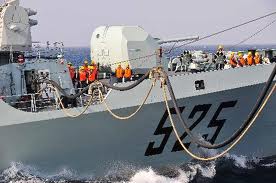
December 2012
Much of the unrest driving the mini-arms race in the Pacific region is based on China’s recent aggression in the South China Sea. While other nations in the region are quite literally up in arms over this new power-play by China, the country may in fact be acting within the bounds of international maritime law.
China has recently declared unilaterally that is patrol boats policing the disputed South China Sea region have the right to board and detain vessels acting illegally in Chinese waters. The main party to this dispute is the Philippines, who deem the disputed area of ocean the “West Philippine Sea” instead.
Despite the regional clamor over China’s move, the country has yet to issue any orders that actually violate international law. According to the United Nations Convention on the Law of the Sea (UNCLOS), sovereign nations have the right to board and detain vessels acting illegally in its own territorial waters, which extend up to 12 miles off-shore of any land held by the country.
Ships acting illegally include those fishing, polluting or conducting unapproved research. Also considered illegal are ships acting to disrupt any activities of the sovereign nation. This includes disseminating propaganda or interfere with communications efforts on-land or in the ocean.
China has always opted out of binding arbitration with the Philippines over the dispute, as is their right according to UNCLOS. However, should it decide to detain another country’s vessel, it could find itself in such a situation at the International Tribunal for the Law of the Sea in Germany (ITLS).
Ghana and Argentina are currently involved in such a dispute, caused when Ghana detained an Argentinian naval vessel over a debt-disagreement. ITLS ruled that as a military vessel, the Argentine ship had immunity.
The biggest danger in this tense situation is not China’s internal policy, but rather the way the acts are being portrayed by media on both sides of the issue. In the backdrop of these maritime-border disputes, which are directly fuel by rights to potential natural resources, is an intense nationalism that goes back centuries.
Despite the potential legality of China’s measures, its regional competitors are easy to ignite into an “us-versus-them” fervor. Regardless of UNCLOS agreements or ITLS rulings, Filipino nationalists will not stop calling for what they see as a forceful reaction to aggression from Beijing. Likewise, politicians are being careful not to look weak in light of these nationalist sentiments, and may be forced to fuel the fire in order to win votes to stay in power.